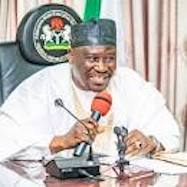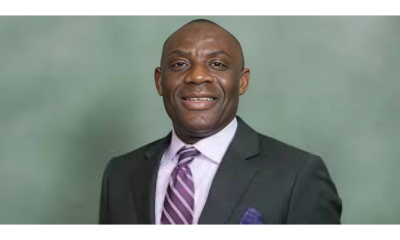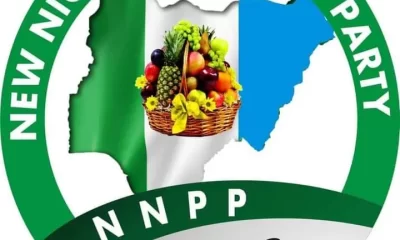Education
Diversity, Education and Autonomy: Developing Nigeria in the Years Ahead
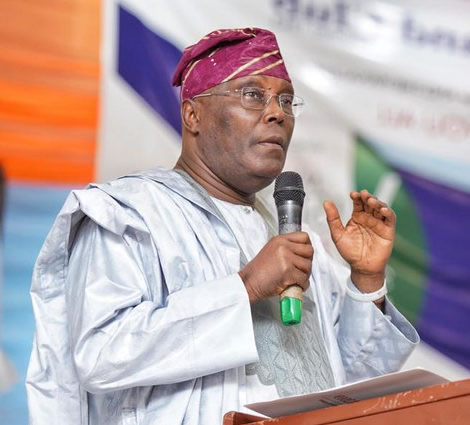
By Atiku Abubakar
I want to talk to you about three interrelated things: Diversity, Education, and Autonomy and their connection to Nigeria’s development in the coming years.
Permit me to start with a personal story.
When I was a little boy my father, who was very poor, refused to send me to school. He did not hate or dislike education of any type. And it was not about school fees; in fact, we were even paid to go to school in those days. He just needed me to herd cattle.That was normal in those days, and, is still so for many families, even today. For refusing to send me to school, he was sent to jail by the local authorities.
Eventually I did go to school. Unfortunately, my father did not live long enough to see where education would take me. He drowned while trying to cross a local river.
He was probably under 40 years of age by the time he died. I was an only child and was raised by my maternal grandparents. As a primary school pupil when I returned from school, I would take our neighbour’s cattle to the bush for rearing in exchange for grains that my grandparents used to help feed the family. So, I was contributing, at that very early age, to the family’s economic wellbeing.
During those early years in school, I had the privilege of being thought by some young American Peace Corps volunteers who approached teaching differently from what we were used to. It struck me that the Americans were more liberal in their approach and encouraged us pupils to think critically about solving problems rather than making us memorize and spit out the same things that were drilled into us.
They also encouraged us to question or challenge their ideas and to be critical of them if necessary. That approach intrigued me and lit a fire in me that still burns to this day.
I eventually left my local Adamawa community and furthered my education in Kano and Zaria. At the School of Hygiene, Kano, I was the Student Union President. So apart from meeting those wonderful Americans, education also took me beyond my locality and began to expose me to the vastness of my region, Northern Nigeria, and its immense diversity.
Education is what helped me to secure a job in the Nigerian public service, a job that took me to many other parts of Nigeria, including its southern edges.
I got to see the vastness and variety of our land, the diversity of its peoples, cultures and levels of development. And in all these travels and movements I got to understand the country, and made so many life-long friends.
These were indeed life-changing experiences. Put simply, we are a very diverse people. But, as anyone who has mingled with other peoples will tell you, diversity does not prevent us from making long-lasting friends across the divides. Diversity is not something to be afraid of.
Diversity does not prevent a country from reaching its potentials. Rather it should make a country reach its potentials faster, but only if that diversity is harnessed properly, if the diverse peoples and places are pulled together for a common purpose, drawing on the strengths of each. In the wrong hands, especially in the hands of opportunistic politicians and demagogues, diversity can become a problem, a tool of division, violence, and destruction.
I realized quite early that education gave me so much and that, if made available to many more young people, will also give them so much and help the country progress just like other countries that take education seriously.
Education enlightens us and opens our eyes to better understand our environment and the world around us; it helps us increase our incomes; it helps us maintain good personal hygiene; it helps us to understand our bodies better and to take steps to improve our overall health; it helps us to understand the challenges facing our communities, our country and the world, and how we can apply ourselves to solving even a tiny part of those challenges. Thus, education helps to provide us with the tools to change the world.
What about autonomy? Education and the success it brought to me helped to make me become a freer person, a more autonomous person.
The more educated you are the more control you tend to have over your life; the more freedom you have to choose what you want to become or what you want to do, where you want to live and with whom you want to associate. Put simply, the more educated you are, the more freedom you tend to have.
Therefore, the educated person is a more autonomous person. So, in a way, you can say that education is freedom. Education is autonomy. Autonomy is critical for the individual or group to reach their full potentials. If a person or a group is held down by others, they cannot achieve their full potentials.
When you are free you are more adventurous; when you are autonomous you are more creative. When you are freer you take more decisions based on what you desire.
As it is with the individual so it is with nations. Education is a social good. Countries that value education and make the necessary investments in it also tend to have more control over their affairs. The nations that treat education and innovation more seriously and invest massively in them are also the leading nations of the world. And in the 21st century education and innovation are key to national prosperity.
And there is more. Educating girls and women is even more impactful. Research spanning over three decades shows that for a society to make progress it is even more important to educate women and girls because of the positive impact it has on the development of children and their health and those of the family.
These the reasons why my philanthropy has focused the most on education.
After so many years of giving scholarships to students from less well-to-do families and helping friends and communities build schools across the country, I began to build a school system in my hometown, Yola, that today incorporates all levels, from kindergarten to university.
Let me tell you a little bit about my town and my state. Adamawa is it at the North East edge of Nigeria, clearly isolated from the power and commercial centres such as Abuja, Kano, Lagos and Port Harcourt.
Although it has produced a good number of successful and prominent Nigerians, it is rather poor. The vast majority of the people are subsistence farmers struggling to eke out a living while battling draught and climate change and, more recently, the Boko Haram insurgency in the parts of the State bordering Borno State.
The insurgency has displaced many people from their homes and farms thereby threatening their very livelihood. In fact, the UN World Food Programme estimates that the number of internally displaced persons in the North East surpassed 2 million by last September.
The existence of the university proved so timely and because Yola was (and remains) safe, the university assisted immensely in feeding nearly 3000 IDPs during the height of the Boko Haram insurgency. And it has been helping the rescued Chibok girls complete their education. In fact, 57 of those girls registered for undergraduate studies at American University of Nigeria this Semester.
University education will prepare them and other students, just like the fresh graduates sitting here today for a life of more meaningful contributions to society and of course, more personal fulfilment.
So why does it seem like the importance of education for a society such as ours is so difficult for some to understand? Why do we seem reluctant to the idea of providing good quality basic education for all our people?
Why can’t we see that the neglect of education for our people has huge long-term consequences which have become obvious already as our country is engulfed in security challenges across its length and breadth?
We persuade parents to vaccinate their children against infectious diseases because vaccination is a good thing. Why don’t we do the same for education? Parents should be persuaded, even forced, to send their children to school so they, at least, acquire basic education.
That basic education should be free and compulsory. I believe that if there are severe consequences for parents who refuse to send their children to have free primary and secondary education, we would not have over 13 million out-of-school children in Nigeria. Certainly not. Our per capita income would not have stagnated for 40 years. Think about it, our per capita income is today what it was forty years ago.
Beyond basic education we should have a variety of options for post-secondary education – university, polytechnic, colleges of education, vocational training for those who would rather acquire vocational and technical skills for particular trades.
As we prioritize education, let us also make full use of our diversity for the development of our country. In addition to ethnic, religious, and regional diversity, we also have diverse endowments – agriculture, crude oil, solid minerals, tropical rain forests, Savanah grasslands; lakes, rivers and streams that dot and snake around the country. As different parts of the country are at different levels of development, local priorities would differ. Earning capacities differ.
Therefore, we need to tailor our development policies and practices to acknowledge this diversity and benefit from it. The constituent parts of the country need a greater degree of autonomy to develop their local economies according to their endowments and priorities.
The excessive centralization of power and concentration of resources in the federal government have not served us well. Instead, they have encouraged a domineering all-knowing federal government that stretches itself into every aspect of our lives with little positive results to show.
Rather we have had excessive corruption, mediocrity, generations of citizens who hope to become rich without work, emasculation of state and local initiatives and a lack of creative and healthy competition among states as they all look towards Abuja for handouts every month.
The development strategies that have produced 13 million out-of-school children, millions of unemployed or under-employed youth, including those with university degrees, and a level of insecurity that threatens to splinter the country into tiny bits controlled by armed warlords are clearly the wrong ones. We must change direction.
We must reverse the concentration of power and resources at the centre. And we must make serious and conscious efforts to identify the potentials and strengths of each state and section of this country and work to maximize its contribution to the development of our country as it is supported to develop itself.
That is how you allow greater autonomy while pulling together. Greater autonomy for states will allow ideas to germinate from anywhere and blossom.
If Kano becomes a thriving industrial city, Jigawa would benefit and soon become an industrial centre as well. If we support the emerging automobile centres in Nnewi, Kaduna, Bauchi and Lagos, the tanneries of Kano would be the natural local suppliers of leather to that sector. If we reverse the on-going de-industrialization and attract tire manufacturing companies back to supply that sector, jobs will be created and the rubber plantations in Edo and surrounding states will benefit. I can go on and on, but you get the picture.
If we have good transport and communication infrastructure and a reasonably free market, no section of a country would develop without the others soon joining in. Capital moves and expands to take advantage of new opportunity centres.
Reduction of federal powers and responsibilities and greater autonomy for states would, for instance, allow a state with very low demand for university spots to decide whether its priority is another federal university or investments in primary, secondary teacher education to ensure that its young population has basic education, preparatory for possible university or vocational education in the future.
I commend Achievers University and its determined and focused Founder, Bode Ayorinde.
When I lived and worked in this part of the country, I realized that the Ondo was the centre of education in the South West. Thankfully, this university will help to maintain that reputation while also benefitting people from other parts of the country.
Thank you Bode for keeping the Ondo spirit and character alive. And thank you for providing this important educational alternative for these young men and women whose lives have certainly been transformed.
To the graduating students, it is your day, your convocation, your chance to go forth and show the world what you can do. To show what you can become. To show that you can lead. To show what problems you can help the world to solve.
Let your imagination run wild. Imagine where you would be in 10 or 20 years from now. Imagine where Nigeria would be. Would you be satisfied with it?
If so, what role would you have played in getting it there? If not, what role would you play in helping to get it to where you would be satisfied with its progress? What would be Nigeria’s population then? How educated would that population be?
What would be the place of crude oil in the world’s energy mix by then? What would that mean for Nigeria? Is there a role that you can play in positioning Nigeria for that trajectory?
Or would you just be fighting the wars we fight today over the sharing of oil revenues?
Would you rather be one of those who move Nigeria beyond oil and other fossil fuels not only to help the country’s economy thrive in a new post-oil world but to also reduce global warming and protect our eco-system? Would you be the one who solves Nigeria’s perennial challenge of providing electricity?
Could you be the one who transforms the Made-in-Aba brands into global icons? Would you be content with debating about which region or zone should produce the next President or governor or rather organize and work to ensure that the country has governance and accountability structures, rules and processes which would ensure that where the president or governor comes from becomes less important?
Remember that Tesla and Amazon, which have made Elon Musk and Jeff Bezos the two richest men on the planet were only founded in 2003 and 1994 respectively.
They became what they are today because they solved problems for the world. Think of the problem you can solve for your community, your country and the world and, hey, you might become our own version of Elon Musk or Jeff Bezos. Once more congratulations. You made it. Now go and make more.
Being Convocation Lecture delivered by Atiku Abubakar, GCON, former Vice President, Federal Republic of Nigeria, at Achievers University, Owo, Ondo State, Nigeria.
I thank you all for listening.
Education
Unresolved Renegotiation: ASUU Sets For Another Showdown With FG

From Ene Asuquo, Calabar
As a result of the unresolved renegotiation between Academic Staff Union of Universities and the Federal Government of Nigeria, the Union has sent a message of
Imminent danger to industrial harmony in Nigerian University system.
In a press statement in Calabar, ASUU has warned that they would embark on an indefinite strict action in a few days to come because of federal government’s insincerity in keeping to terms after the 14-day warning strike and another four weeks of grace was given which will expire on the 21st of November 2025.
According to them, “We have gathered not merely as members of ASUU, but as citizens whose patience has been stretched far beyond its elastic limits.
Occasioned by broken promises, shattered dreams, and deepening crises in the education sector, we hereby express deep concern over government’s inconsistency and dilatory approach to agreements, engagements and negotiations”.They stated that the renegotiation of the 2009 FGN/ASUU Agreement was not a gift. It was an obligation to Nigerian University Lecturers. Government owes Lecturers their due wages and her citizens and the dignity of decent and functional education.
They maintained that the fight is for the survival of Nigeria’s intellectual soul, while outlining the issues in contention to include: renegotiation of workers’ Conditions of Service since 2009 in tandem with changing times and inflationary trends over the years, funding for revitalization of infrastructures, University autonomy, academic freedom, undue proliferation of Universities without assured sustainable funding.
The Union stressed further that Government grandstanding, insensitivity and silence are deliberate to destroy academic system and ASUU is ready to shut down totally and completely in a few days.
Recall that ASUU gave the FGN 14-day ultimatum to conclude the renegotiation which according to them was enough to made government do the needful and they watched to no avail. ASUU then graduated to 2 weeks Warning Strike, which was suspended after NEC of 22nd October, 2025 due to the intervention of well-meaning Nigerians, the Nigeria Labour Congress, parents and students to create enabling opportunity for a meaningful dialogue.
“Let the Federal Government return to the path of truth, fairness and good conscience. Let the government hear us clearly: they cannot destroy public education, starve lecturers with a slavish salary, deduct and withhold part of legitimate Lecturers salaries by way of 3rd party deductions, deny students a conducive environment for effective learning and expect peace”.
“ASUU has been consistent: we are not asking for personal enrichment. We are demanding that the government fulfills its obligations to the Nigerian people by funding education properly, otherwise, we shall resume the STRIKE itself; not the father or mother of all strikes”.
“This will be a total, comprehensive and indefinite strike action. We are ready to shut down for as long as the government wants it to last because he who has been pushed down fears no fall Education is the foundation of personal and national development,” the stated.
“The problem is not paucity of funds as the government posits but lack of political will to invest in the development of Nigeria. The figures and empirical data from Federation Account Allocation Committee (FAAC) has revealed that in 2022, States received N3.02 trillion while in 2024, the figures rose to N5.81 trillion with an increase of over 62%. Similarly, federal allocations rose from N3.42 trillion in 2022 to N4.65 trillion with an increase of over 70%. This is clear evidence that the government has the capacity to pay Lecturers”. They maintained.
Education
TVET: FG Begins Nationwide Training for 100,000 Youths in 1,500 Centers
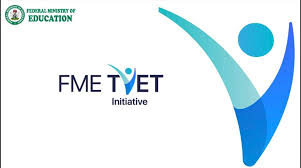
The Federal Government has begun training no fewer than 100,000 youths in 1,500 Technical and Vocational Education and Training (TVET) centers across the country.
The Minister of State for Education, Prof. Suwaiba Sa’id, made the announcement on Monday in Kano.
This was during an inspection visit to Bayero University, Kano (BUK), where Sa’id assessed ongoing vocational training initiatives supported by the ministry.
“The administration is committed to expanding opportunities for our youths to acquire industry-relevant skills that will make them self-reliant and employable,” she said.
The minister said that the programme covered a wide range of trades including carpentry, welding, plumbing, ICT, automobile repair, tailoring, among other skills in high demand.
She said that the initiative was designed to ensure that beneficiaries of the programme became self-reliant, job creators and active contributors to the nation’s economic growth.
According to her, the provision of starter packs will complement the government’s drive to reducing unemployment and addressing the persistent skills gap in the country.
“The administration of President Bola Tinubu is committed to strengthening technical and vocational education because it remains a critical pathway to empowering young Nigerians.
“Providing starter packs will enable our youths to put their training into practical use immediately,” she said.
Sa’id commended BUK for its commitment toward implementing the programme.
She said that the ministry would continue to partner institutions that promoted innovation, productivity and entrepreneurship.
Also speaking, the Vice-Chancellor, BUK, Prof. Haruna Musa, said the programme was timely as the country continued to grapple with low employability, reduced productivity and slow economic growth.
Those, he said, were due to inadequate skills among its youth population.
Musa was represented by the Deputy Vice-Chancellor (Academic), Prof. Ahmad Tsauni.
He said the programme was designed to equip young Nigerians with practical and entrepreneurial skills that would enhance job creation, innovation and national development.
Musa encouraged participants to take full advantage of the opportunity by learning diligently and transforming themselves into agents of positive change in their communities.
“BUK will continue to invest in research, innovation and strategic partnerships to expand opportunities for youth employment and industrial growth,” he said
The vice-chancellor commended the Federal Ministry of Education and other partners for their support in ensuring the successful take-off of the programme.
A beneficiary, Muhammad Ali lauded the government for, what he described as, the timely gesture.
He expressed appreciation, describing the initiative as a crucial step toward youth empowerment and national development.
Education
Mainstream Energy to Upgrade ABU Roads, Facilities

Mainstream Energy Solutions, a privately-owned power-generating company, has offered to support infrastructure renewal at the Ahmadu Bello University (ABU), Zaria.
This was disclosed in a statement issued on Saturday in Zaria by the Director, Public Affairs Directorate of the university, Malam Auwalu Umar.
He said the company also announced plans to partner with the institution on its 45th convocation scheduled for January 2026.
According to him, the form has also pledged to assist in the upgrade of the university’s internal roads, most of which were constructed in the 1960s and have never been rehabilitated.
“The institution’s nearly 30 kilometres of internal roads across its two campuses are currently in a state of near collapse.
“The company also indicated readiness to support the rehabilitation of toilets and improvement of water supply on the campuses.
“As part of preparations for the convocation, the company will give the 1,000-seater Abdullahi Mahadi Conference Centre a facelift ahead of the convocation lecture,” Umar said.
He quoted the Vice-Chancellor, Prof. Adamu Ahmed, as expressing deep appreciation for what he described as a long-standing and growing partnership since 2017.
He recalled paying a courtesy visit to the company in Abuja earlier in the week to thank it for its sustained support.
He stated that mainstream energy’s interventions had consistently come at crucial moments, especially when the university’s energy cost escalated to an unsustainable N370 million in May 2025.
Ahmed said the university was particularly excited about the company’s plan to replicate a Kainji Dam-model power plant at ABU’s Faculty of Engineering; a project expected to revolutionise practical training and research.
He also described as “a powerful demonstration of belief in the future of Nigerian youths” the firm’s decision last week to convey 20 ABU students via chartered flight to the Kainji facility for a hands-on excursion.
“Mainstream Energy Solutions has truly set a benchmark for industry-academia collaboration in Nigeria, aligned with national development goals,” Ahmed said.



